大学英语presentation新闻播报
- 格式:ppt
- 大小:1.88 MB
- 文档页数:10
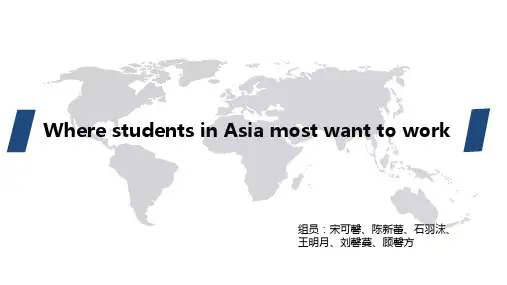
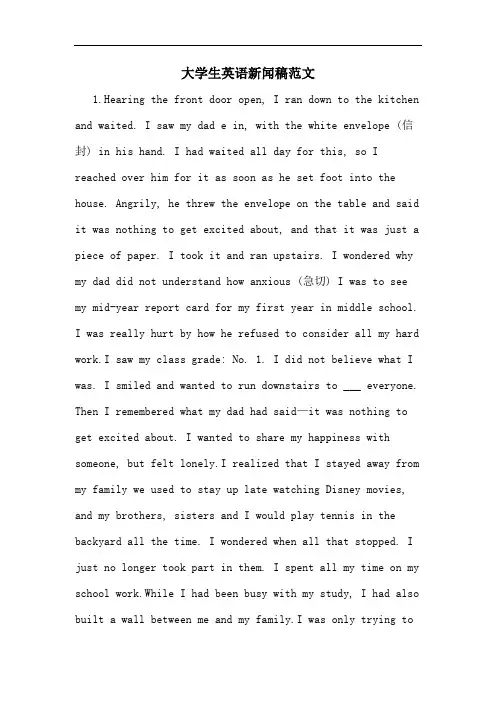
大学生英语新闻稿范文1.Hearing the front door open, I ran down to the kitchen and waited. I saw my dad e in, with the white envelope (信封) in his hand. I had waited all day for this, so I reached over him for it as soon as he set foot into the house. Angrily, he threw the envelope on the table and said it was nothing to get excited about, and that it was just a piece of paper. I took it and ran upstairs. I wondered why my dad did not understand how anxious (急切) I was to see my mid-year report card for my first year in middle school.I was really hurt by how he refused to consider all my hard work.I saw my class grade: No. 1. I did not believe what I was. I smiled and wanted to run downstairs to ___ everyone. Then I remembered what my dad had said—it was nothing to get excited about. I wanted to share my happiness with someone, but felt lonely.I realized that I stayed away from my family we used to stay up late watching Disney movies, and my brothers, sisters and I would play tennis in the backyard all the time. I wondered when all that stopped. I just no longer took part in them. I spent all my time on my school work.While I had been busy with my study, I had also built a wall between me and my family.I was only trying tobee a person everyone could be proud of. I wanted to go downstairs, say sorry for my rude behavior and for every refused movie and tennis game, and be part of my family again. I knew I had to do something—because without their support, my achievement meant nothing.【小题1】t’s very clear that the writer did .A.much worse in his study than she had expectedB.a lot better in his study than she had expectedC.as well as she had expected in his studyD.not well as she had expected in his study【小题2】After the writer saw the grade, she wanted to run downstairsto .A. ___ everyone how hard he workedB.stay away from othersC.watch Disney movies with his familyD.share her happiness with others【小题3】We can infer from the passage that .A.the writer was once very impolite to her familiesB.the writer’s father felt angry about the school reportC.the family were all proud of the writerD.the writer once spent all his time building a wall【小题4】Which is the best title for the passage?A.Change Myself FirstB.Praise Me, DadC.My School ReportD.Scores, No. 1 in Life?【答案】【小题1】B【小题2】D【小题3】A【小题4】D【考点】初中英语知识点【解析】试题分析:作者看到成绩后,她想跑到楼下去和别人分享她的快乐。
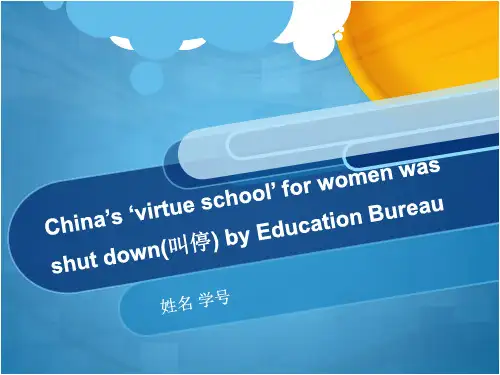

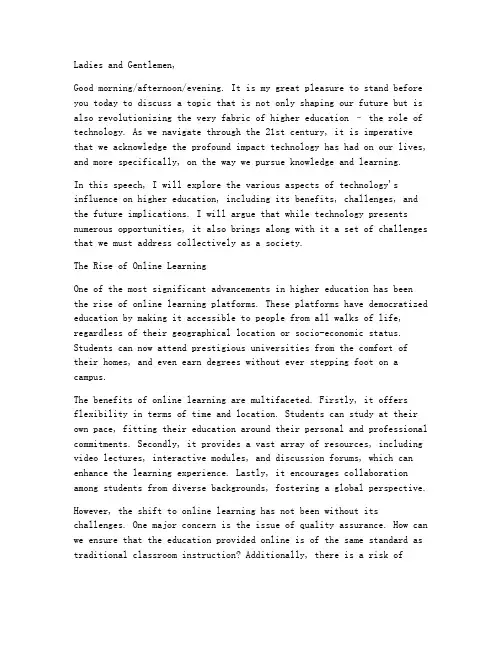
Ladies and Gentlemen,Good morning/afternoon/evening. It is my great pleasure to stand before you today to discuss a topic that is not only shaping our future but is also revolutionizing the very fabric of higher education – the role of technology. As we navigate through the 21st century, it is imperative that we acknowledge the profound impact technology has had on our lives, and more specifically, on the way we pursue knowledge and learning.In this speech, I will explore the various aspects of technology's influence on higher education, including its benefits, challenges, and the future implications. I will argue that while technology presents numerous opportunities, it also brings along with it a set of challenges that we must address collectively as a society.The Rise of Online LearningOne of the most significant advancements in higher education has been the rise of online learning platforms. These platforms have democratized education by making it accessible to people from all walks of life, regardless of their geographical location or socio-economic status. Students can now attend prestigious universities from the comfort of their homes, and even earn degrees without ever stepping foot on a campus.The benefits of online learning are multifaceted. Firstly, it offers flexibility in terms of time and location. Students can study at their own pace, fitting their education around their personal and professional commitments. Secondly, it provides a vast array of resources, including video lectures, interactive modules, and discussion forums, which can enhance the learning experience. Lastly, it encourages collaboration among students from diverse backgrounds, fostering a global perspective.However, the shift to online learning has not been without its challenges. One major concern is the issue of quality assurance. How can we ensure that the education provided online is of the same standard as traditional classroom instruction? Additionally, there is a risk ofincreased isolation and decreased social interaction among students, which can have adverse effects on their overall development.Innovation in Teaching and LearningTechnology has also brought about innovative teaching methods that were once unimaginable. For instance, the use of artificial intelligence (AI) in education has enabled personalized learning experiences. AI algorithms can analyze student performance data to identify areas where they struggle and tailor the curriculum accordingly. This not only improves learning outcomes but also boosts student engagement.Virtual Reality (VR) and Augmented Reality (AR) technologies have also found their way into higher education. These technologies can create immersive learning environments that simulate real-world scenarios, making the learning experience more interactive and memorable. For example, medical students can practice surgery using VR, while architecture students can explore building designs in a 3D space.While these innovations are promising, they also require significant investment in terms of technology infrastructure and training for educators. There is a need for continuous professional development to ensure that faculty members are equipped to leverage these tools effectively.The Digital DivideOne of the most pressing challenges facing higher education is thedigital divide. Not all students have equal access to technology and the internet, which can create barriers to learning. In many rural or underprivileged areas, the lack of reliable internet connectivity and computer hardware means that some students are left behind.Closing the digital divide requires a coordinated effort from governments, educational institutions, and private sector entities. Initiatives such as providing subsidized or free internet access, establishing community learning centers, and offering digital literacy programs can help bridge this gap.The Future of Higher EducationAs we look to the future, it is clear that technology will continue to play a pivotal role in higher education. The question is not whether technology will transform education, but how we will adapt to these changes. Here are some predictions for the future:1. Hybrid Models: A blend of online and traditional classroom learning will become more prevalent, allowing for the best of both worlds.2. Blended Learning: Technology will be used to supplement face-to-face instruction, making learning more dynamic and engaging.3. Data-Driven Education: The use of big data analytics will enable educators to make informed decisions about curriculum design and student support.4. Automation and AI: While AI may replace certain tasks, it will also create new opportunities for human-centric work, such as critical thinking and creativity.In conclusion, technology has the potential to transform higher education in ways we never imagined. It offers unprecedented opportunities for accessibility, innovation, and personalization. However, it also presents challenges that require our attention. As we move forward, it is crucial that we embrace technology while ensuring that it serves the needs of all students, regardless of their background.Thank you for your attention. I welcome any questions you may have regarding the role of technology in transforming higher education.---Note: This speech is a fictional example and is intended to provide a framework for a potential real-world speech. It is not a direct representation of any specific facts or events.。
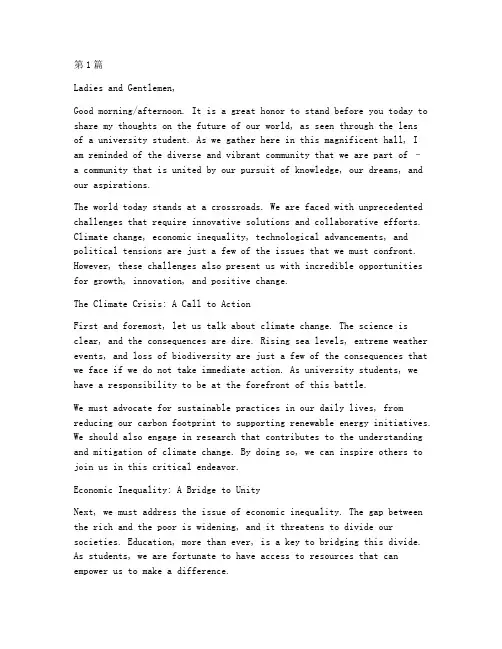
第1篇Ladies and Gentlemen,Good morning/afternoon. It is a great honor to stand before you today to share my thoughts on the future of our world, as seen through the lensof a university student. As we gather here in this magnificent hall, I am reminded of the diverse and vibrant community that we are part of –a community that is united by our pursuit of knowledge, our dreams, and our aspirations.The world today stands at a crossroads. We are faced with unprecedented challenges that require innovative solutions and collaborative efforts. Climate change, economic inequality, technological advancements, and political tensions are just a few of the issues that we must confront. However, these challenges also present us with incredible opportunities for growth, innovation, and positive change.The Climate Crisis: A Call to ActionFirst and foremost, let us talk about climate change. The science is clear, and the consequences are dire. Rising sea levels, extreme weather events, and loss of biodiversity are just a few of the consequences that we face if we do not take immediate action. As university students, we have a responsibility to be at the forefront of this battle.We must advocate for sustainable practices in our daily lives, from reducing our carbon footprint to supporting renewable energy initiatives. We should also engage in research that contributes to the understanding and mitigation of climate change. By doing so, we can inspire others to join us in this critical endeavor.Economic Inequality: A Bridge to UnityNext, we must address the issue of economic inequality. The gap between the rich and the poor is widening, and it threatens to divide our societies. Education, more than ever, is a key to bridging this divide. As students, we are fortunate to have access to resources that can empower us to make a difference.We should strive to create a more inclusive educational environment that allows students from all backgrounds to succeed. Furthermore, we must advocate for policies that promote fair wages, social security, and economic opportunities for all. By doing so, we can create a more equitable and just world.Technological Advancements: A Catalyst for InnovationThe rapid pace of technological advancements has the potential to transform our lives for the better. Artificial intelligence, blockchain, and biotechnology are just a few examples of the groundbreaking innovations that are shaping our future. As university students, we are at the forefront of this technological revolution.We must embrace these advancements with an open mind and a spirit of innovation. By doing so, we can create solutions to some of the world's most pressing problems. Moreover, we should use technology to connect with others, to share knowledge, and to foster global understanding.Political Tensions: A Path to PeaceIn an increasingly interconnected world, political tensions can havefar-reaching consequences. As students, we have the power to promote dialogue and understanding between different cultures and nations. We must work towards fostering a culture of peace and tolerance.We can start by engaging in international exchange programs, where wecan learn from one another and build bridges of friendship. Additionally, we should support initiatives that promote diplomacy and conflict resolution. By doing so, we can contribute to a more stable and peaceful world.The Role of Universities in Shaping the FutureUniversities, as institutions of higher learning, play a crucial role in shaping the future. They are not only places where knowledge is acquired but also hubs of innovation and cultural exchange. As students, we are the future leaders, and it is our responsibility to ensure that our universities live up to their potential.We must advocate for a curriculum that equips us with the skills and knowledge necessary to tackle the challenges of tomorrow. We should also encourage our universities to foster a culture of innovation, where ideas are welcomed and collaboration is valued.Conclusion: Together We Can Shape the FutureIn conclusion, the future of our world is in our hands. As university students, we have the power to drive positive change, to innovate, and to inspire others. By addressing the challenges of climate change, economic inequality, technological advancements, and political tensions, we can create a more sustainable, equitable, and peaceful world.Let us not underestimate the impact we can have. Let us be the change-makers, the visionaries, and the leaders that our world needs. Together, we can shape the future, and together, we can make it a better place for all.Thank you for your attention, and let us embark on this journey of discovery, collaboration, and positive change.End of Speech第2篇Ladies and Gentlemen,Good morning! It is with great pleasure and immense pride that I stand before you today to deliver this speech, which marks a significant moment in our university's journey towards global connectivity. As we gather here today, we are part of a vibrant community that values education, diversity, and the pursuit of knowledge. And in this pursuit, English stands as a universal language that connects us all.In the ever-evolving world we live in, where technology has shrunk the globe and brought people closer than ever before, the importance of English cannot be overstated. It is the lingua franca of the global village, a bridge that connects cultures, ideas, and opportunities. Therefore, I urge each and every one of us to embrace the power of English and make it an integral part of our lives.Let us begin by acknowledging the role that English has played in shaping the history of our university. Founded in the spirit of international exchange and academic excellence, our institution has always strived to provide a platform for students from diverse backgrounds to come together and learn from one another. English, as our medium of instruction, has been the cornerstone of this mission, enabling us to offer a world-class education that transcends geographical boundaries.Today, as we celebrate the importance of English, let us reflect on the following key points:1. Cultural Exchange: English has the power to break down cultural barriers and foster a sense of unity among people from different walks of life. By learning English, we gain the ability to communicate with confidence and empathy, understanding the perspectives and experiences of others. This cultural exchange not only enriches our personal growth but also prepares us to be global citizens who can contribute to the betterment of society.2. Career Opportunities: In today's interconnected world, proficiency in English is a prerequisite for success in the global job market. English-speaking countries offer a plethora of career opportunities, from multinational corporations to international organizations. By mastering English, we equip ourselves with the skills needed to navigate this competitive landscape and secure our future.3. Academic Excellence: English is the language of science, technology, and research. By being proficient in English, we gain access to a vast repository of knowledge, enabling us to stay updated with the latest advancements in our fields. Moreover, publishing our research in English ensures that our work reaches a wider audience, fostering collaboration and innovation.4. Personal Development: Learning English is not just about acquiring a language; it is about personal development. It enhances our cognitive abilities, boosts our confidence, and opens our minds to new ideas. It teaches us patience, discipline, and the importance of perseverance.These skills are invaluable in all aspects of our lives, whether in our academic pursuits or our personal growth.As we commit ourselves to embracing the power of English, let us also recognize the challenges that lie ahead. It is not an easy task to master a new language, especially when we are surrounded by our native tongues. However, it is through overcoming these challenges that we can truly appreciate the beauty and power of English.Here are some steps that we can take to enhance our English proficiency:1. Practice Regularly: Like any skill, learning a language requires consistent practice. Dedicate time each day to reading, writing, speaking, and listening in English. Engage with native speakers through conversation clubs, language exchange partners, or online communities.2. Immerse Yourself in English: Surround yourself with English as much as possible. Watch English movies, listen to English music, and read English books. This will help you become more comfortable with the language and improve your pronunciation and vocabulary.3. Seek Professional Guidance: If you find it difficult to learn English on your own, consider joining language courses or hiring a tutor. A professional can provide personalized guidance and help you overcome your challenges.4. Stay Motivated: Set realistic goals and celebrate your progress. Remember that learning a language is a journey, and every step forward is a victory.In conclusion, ladies and gentlemen, the power of English lies not just in its ability to connect us with the world, but in its potential to transform our lives. By embracing the power of English, we can unlock a world of opportunities, broaden our horizons, and become true global leaders.Let us pledge today to make English an integral part of our university experience. Let us commit ourselves to continuous learning, to embracing diversity, and to fostering a culture of excellence. Together, we cancreate a brighter future, where the power of English will enable us to build bridges of understanding and collaboration across the globe.Thank you for your attention, and let us embark on this exciting journey towards global connectivity, hand in hand, with the power of English by our side.God bless our university, and God bless the power of English.[Applause]第3篇Ladies and Gentlemen,Good morning/afternoon/evening, esteemed faculty, proud parents, and most importantly, the vibrant members of our university community. It is with great honor and enthusiasm that I stand before you today to deliver this speech, which I hope will resonate with each and every one of us as we embark on another academic year filled with promise and potential.First and foremost, let me extend my warmest welcome to the new batch of students who have joined our esteemed university. You have chosen a remarkable institution to further your education, and I am confidentthat the knowledge, skills, and experiences you will gain here will shape you into the leaders of tomorrow. To our returning students, faculty, and staff, thank you for your unwavering commitment to our university's mission and vision.Today, I would like to share with you my vision for our university – a dynamic and inclusive community that not only fosters academicexcellence but also nurtures personal growth, social responsibility, and global awareness. As we stand at the threshold of this new academic year, it is imperative that we reflect on our values, recommit to our goals, and work together to create a future that is both bright and sustainable.1. Embracing Diversity and InclusionIn the ever-evolving world we live in, diversity is not just a buzzword; it is a fundamental principle that underpins the success of anyinstitution. Our university must be a sanctuary for diverse perspectives, cultures, and backgrounds. We must celebrate our differences and use them as a catalyst for innovation and creativity.To achieve this, we must:- Promote inclusivity in all our programs and initiatives.- Establish mentorship programs that connect students from different backgrounds.- Organize cultural exchange events that foster mutual understanding and respect.- Ensure that our faculty and staff reflect the diversity of our student body.By embracing diversity and inclusion, we not only enrich our own lives but also prepare our students to thrive in a globalized world.2. Advancing Academic ExcellenceAcademic excellence is the cornerstone of our university's reputation. We must continue to push the boundaries of knowledge, challenge conventional wisdom, and encourage critical thinking among our students.To achieve this, we must:- Invest in state-of-the-art facilities and resources to supportresearch and learning.- Recruit and retain top-tier faculty members who are experts in their fields.- Provide opportunities for interdisciplinary collaboration and exchange.- Encourage students to engage in research projects and internships that enhance their practical skills.By fostering a culture of academic excellence, we empower our studentsto become lifelong learners and contributors to society.3. Nurturing Personal Growth and Social ResponsibilityEducation is not merely about accumulating knowledge; it is also about developing the whole person. Our university must provide a holistic education that nurtures personal growth, social responsibility, and ethical leadership.To achieve this, we must:- Offer a wide range of extracurricular activities that promote physical, mental, and emotional well-being.- Encourage students to participate in community service projects and volunteer work.- Organize workshops and seminars that address social issues and promote ethical decision-making.- Support student-led initiatives that aim to make a positive impact on society.By nurturing personal growth and social responsibility, we prepare our students to become well-rounded individuals who can make a difference in the world.4. Fostering Global AwarenessIn today's interconnected world, it is crucial for our students to have a global perspective. Our university must be a gateway to the world, where students can learn from and engage with people from different cultures and backgrounds.To achieve this, we must:- Establish partnerships with universities around the globe tofacilitate student and faculty exchanges.- Offer study abroad programs that allow students to immerse themselves in different cultures.- Organize international conferences and seminars that bring together scholars and experts from various fields.- Promote the use of technology to connect our students with peers and mentors worldwide.By fostering global awareness, we equip our students with the skills and knowledge needed to navigate and succeed in an increasingly globalized world.ConclusionIn conclusion, as we embark on this new academic year, let us remember that our university is more than just a place of learning; it is a community of dreamers, innovators, and leaders. Together, we have the power to shape a future that is both dynamic and inclusive, where every individual is valued and has the opportunity to thrive.As we work towards achieving our vision, let us not forget the importance of collaboration, respect, and perseverance. Let us embrace the challenges ahead with courage and determination, and let us celebrate our successes with humility and gratitude.To our new students, welcome to the family. To our returning students, faculty, and staff, let us continue to inspire and support each other. To our proud parents, thank you for your unwavering support.Let us come together as one, united in our mission to create a brighter, more inclusive future for all.Thank you.。
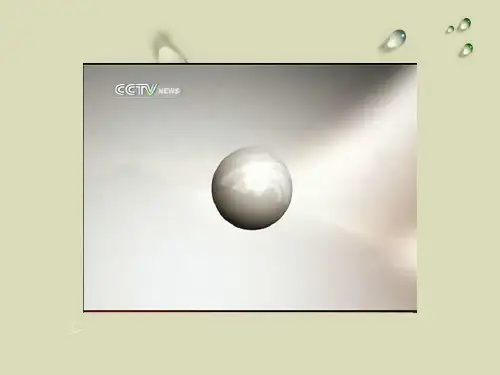
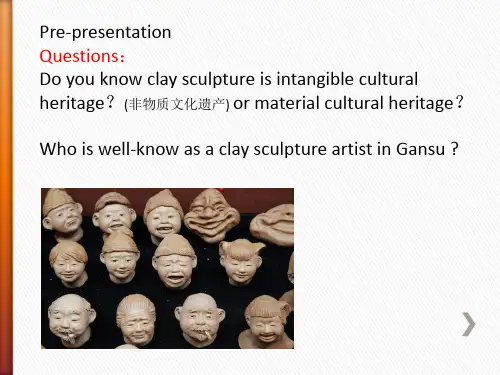
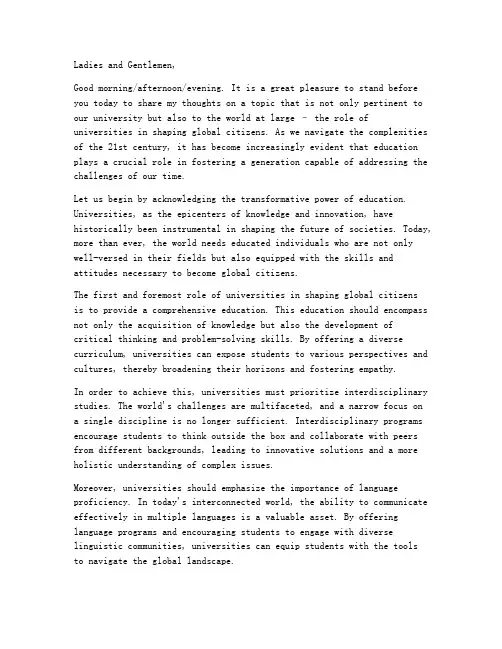
Ladies and Gentlemen,Good morning/afternoon/evening. It is a great pleasure to stand before you today to share my thoughts on a topic that is not only pertinent to our university but also to the world at large – the role ofuniversities in shaping global citizens. As we navigate the complexities of the 21st century, it has become increasingly evident that education plays a crucial role in fostering a generation capable of addressing the challenges of our time.Let us begin by acknowledging the transformative power of education. Universities, as the epicenters of knowledge and innovation, have historically been instrumental in shaping the future of societies. Today, more than ever, the world needs educated individuals who are not only well-versed in their fields but also equipped with the skills and attitudes necessary to become global citizens.The first and foremost role of universities in shaping global citizensis to provide a comprehensive education. This education should encompass not only the acquisition of knowledge but also the development ofcritical thinking and problem-solving skills. By offering a diverse curriculum, universities can expose students to various perspectives and cultures, thereby broadening their horizons and fostering empathy.In order to achieve this, universities must prioritize interdisciplinary studies. The world's challenges are multifaceted, and a narrow focus on a single discipline is no longer sufficient. Interdisciplinary programs encourage students to think outside the box and collaborate with peers from different backgrounds, leading to innovative solutions and a more holistic understanding of complex issues.Moreover, universities should emphasize the importance of language proficiency. In today's interconnected world, the ability to communicate effectively in multiple languages is a valuable asset. By offering language programs and encouraging students to engage with diverse linguistic communities, universities can equip students with the toolsto navigate the global landscape.Another crucial aspect of shaping global citizens is fostering cultural competence. Universities should provide opportunities for students to study and immerse themselves in different cultures, whether through study abroad programs, cultural exchange initiatives, or even on-campus cultural events. This exposure not only enriches students' personal growth but also prepares them to work and live in diverse environments.Furthermore, universities have a responsibility to instill ethical values in their students. As future leaders and change-makers, students must be equipped with a strong moral compass. This can be achieved through ethical education programs, discussions on contemporary social issues, and opportunities for community service. By encouraging students to reflect on their values and actions, universities can cultivate responsible global citizens.In addition to academic and ethical development, universities should also focus on preparing students for the workforce. In an era of rapid technological advancement, the skills required for success are constantly evolving. Universities must adapt their curricula to reflect these changes and provide students with the necessary technical and soft skills to thrive in the global market.Furthermore, universities should encourage entrepreneurship and innovation. By fostering an entrepreneurial mindset, universities can inspire students to think creatively and take risks. This not only benefits the students themselves but also contributes to economic growth and social progress.Lastly, it is essential for universities to promote sustainability and environmental consciousness. As climate change and environmental degradation continue to pose significant threats to our planet, it is crucial that future generations are equipped with the knowledge and skills to address these challenges. Universities can play a pivotal role in this endeavor by incorporating sustainability into their research, teaching, and campus operations.In conclusion, the role of universities in shaping global citizens is multifaceted and of paramount importance. By providing a comprehensiveeducation, fostering cultural competence, instilling ethical values, preparing students for the workforce, encouraging entrepreneurship, and promoting sustainability, universities can equip students with the tools and attitudes necessary to become effective leaders and change-makers in our interconnected world.As we move forward, let us remember that universities are not just institutions of higher learning but also agents of change. Together, we can work towards creating a more just, sustainable, and peaceful world, one global citizen at a time.Thank you for your attention.[Applause]---Note: This speech has been tailored to a general audience and focuses on the broader role of universities in shaping global citizens. Depending on the specific context and audience, the speech can be further tailored to address specific challenges, initiatives, or case studies.。
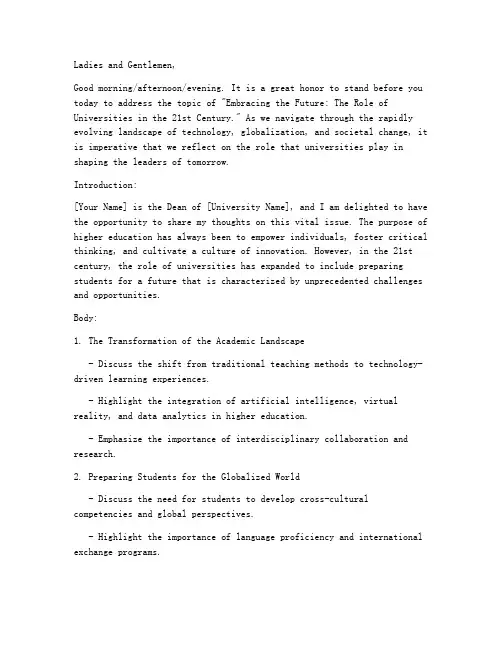
Ladies and Gentlemen,Good morning/afternoon/evening. It is a great honor to stand before you today to address the topic of "Embracing the Future: The Role of Universities in the 21st Century." As we navigate through the rapidly evolving landscape of technology, globalization, and societal change, it is imperative that we reflect on the role that universities play in shaping the leaders of tomorrow.Introduction:[Your Name] is the Dean of [University Name], and I am delighted to have the opportunity to share my thoughts on this vital issue. The purpose of higher education has always been to empower individuals, foster critical thinking, and cultivate a culture of innovation. However, in the 21st century, the role of universities has expanded to include preparing students for a future that is characterized by unprecedented challenges and opportunities.Body:1. The Transformation of the Academic Landscape- Discuss the shift from traditional teaching methods to technology-driven learning experiences.- Highlight the integration of artificial intelligence, virtual reality, and data analytics in higher education.- Emphasize the importance of interdisciplinary collaboration and research.2. Preparing Students for the Globalized World- Discuss the need for students to develop cross-cultural competencies and global perspectives.- Highlight the importance of language proficiency and international exchange programs.- Encourage students to engage in global issues and contribute to sustainable development.3. Nurturing Innovation and Entrepreneurship- Discuss the role of universities in fostering an entrepreneurial mindset among students.- Highlight successful university incubators and innovation centers.- Encourage students to pursue interdisciplinary projects and collaborate with industry leaders.4. The Impact of Technology on Higher Education- Discuss the challenges and opportunities presented by digital transformation in education.- Highlight the importance of digital literacy and cybersecurity education.- Encourage universities to invest in infrastructure and training to support technology integration.5. Addressing Social Inequality and Access to Education- Discuss the importance of making higher education accessible to all, regardless of socio-economic background.- Highlight the role of scholarships, financial aid, and outreach programs.- Encourage universities to promote diversity and inclusion on campus.6. The Role of Universities in Promoting Sustainable Development- Discuss the importance of sustainability in university operations and research.- Highlight successful sustainability initiatives and partnerships with industry and local communities.- Encourage students to engage in sustainability projects and advocate for change.Conclusion:In conclusion, the role of universities in the 21st century is more crucial than ever. As institutions of higher learning, we have a responsibility to prepare students for a future that is characterized by rapid change and complex challenges. By embracing innovation, fostering global competencies, nurturing entrepreneurship, and promoting sustainability, universities can become catalysts for positive change.As we move forward, it is essential that we:- Continue to invest in technology and infrastructure to supportcutting-edge research and learning experiences.- Foster a culture of inclusivity and diversity, ensuring that all students have equal access to education and opportunities.- Collaborate with industry, government, and civil society to address global issues and promote sustainable development.Ladies and gentlemen, the future is bright, but it is also uncertain. As we navigate the complexities of the 21st century, let us remember that universities have the power to shape the leaders of tomorrow. Together, we can create a future where education is a force for good, driving progress, and making a positive impact on our world.Thank you for your attention, and I welcome your questions and feedback.[Your Name]Dean, [University Name]。
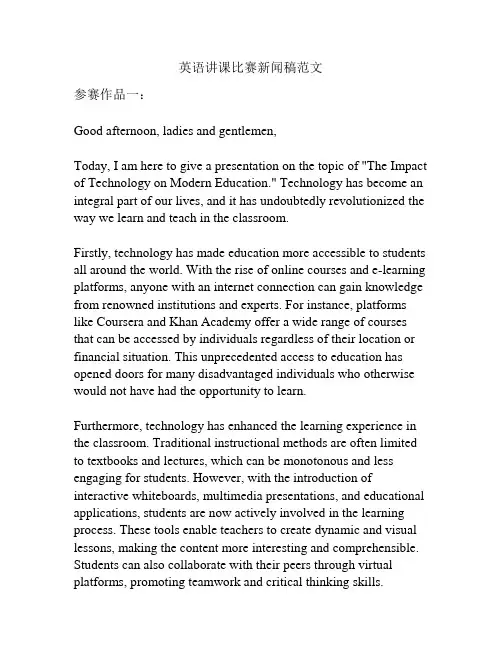
英语讲课比赛新闻稿范文参赛作品一:Good afternoon, ladies and gentlemen,Today, I am here to give a presentation on the topic of "The Impact of Technology on Modern Education." Technology has become an integral part of our lives, and it has undoubtedly revolutionized the way we learn and teach in the classroom.Firstly, technology has made education more accessible to students all around the world. With the rise of online courses and e-learning platforms, anyone with an internet connection can gain knowledge from renowned institutions and experts. For instance, platforms like Coursera and Khan Academy offer a wide range of courses that can be accessed by individuals regardless of their location or financial situation. This unprecedented access to education has opened doors for many disadvantaged individuals who otherwise would not have had the opportunity to learn.Furthermore, technology has enhanced the learning experience in the classroom. Traditional instructional methods are often limited to textbooks and lectures, which can be monotonous and less engaging for students. However, with the introduction of interactive whiteboards, multimedia presentations, and educational applications, students are now actively involved in the learning process. These tools enable teachers to create dynamic and visual lessons, making the content more interesting and comprehensible. Students can also collaborate with their peers through virtual platforms, promoting teamwork and critical thinking skills.Additionally, technology has facilitated personalized learning experiences. Every student is unique, with different learning styles and pace. In a traditional classroom, it can be challenging for teachers to cater to individual needs effectively. However, with the help of educational software and analytics, teachers can track students' progress and identify areas where they need additional support. Adaptive learning platforms can adjust to each student's abilities and provide personalized content and exercises accordingly. This personalized approach ensures that every student receives the attention and resources they require to succeed.However, it is crucial to acknowledge the potential drawbacks of technology in education. Excessive screen time and reliance on devices may lead to a decrease in face-to-face interaction and physical activity. It is essential for educators to find a balance between technology and traditional teaching methods, ensuring that students develop social skills and remain physically active.In conclusion, the impact of technology on modern education has been transformative. It has brought education to the fingertips of millions, improved classroom engagement, and enabled personalized learning experiences. It is our responsibility as educators to adapt to these changes and ensure that technology is used in a balanced and effective manner for the benefit of our students.Thank you for your attention, and I look forward to your questions.。
Good morning/afternoon/evening. It is a great honor to stand before you today to address a topic that is not only vital to our present but also has the potential to shape our future. The subject I wish to discuss is the urgent need for sustainable development and the role of technologyin achieving it.As we gather here today, the world is at a critical juncture. Our planet is facing numerous challenges, including climate change, biodiversity loss, and resource depletion. These issues are not just environmental concerns; they are economic, social, and political ones as well. The clock is ticking, and we must act now to ensure a sustainable future for generations to come.Let us start with climate change. The Intergovernmental Panel on Climate Change (IPCC) has been crystal clear in its assessment: global warmingis a reality, and it is primarily caused by human activities. The consequences are severe—more frequent and severe weather events, rising sea levels, and the disruption of ecosystems. We cannot afford to ignore these warnings.To combat climate change, we need a multifaceted approach. First and foremost, we must reduce our carbon footprint. This means transitioning to renewable energy sources, such as solar, wind, and hydroelectric power. We must also invest in energy efficiency and promote sustainable transportation options. Electric vehicles, for instance, are a step in the right direction.However, technology alone is not the silver bullet. We must also address the social and economic aspects of sustainability. This involves creating jobs in the green sector, ensuring that the transition to alow-carbon economy is inclusive and equitable. We must also educate our populations about the importance of sustainable living practices and encourage behavioral change.Enter the role of technology. In recent years, we have witnessed a technological revolution that has the potential to transform our world for the better. From artificial intelligence to blockchain, frombiotechnology to the Internet of Things (IoT), these innovations are not just exciting; they are essential tools in our quest for sustainability.Artificial intelligence, for example, can help us optimize energy consumption in buildings and cities. By analyzing data and learning patterns, AI systems can predict energy needs and adjust systems accordingly. This not only saves money but also reduces our environmental impact.Blockchain technology, on the other hand, can ensure transparency and traceability in supply chains. This is crucial for sustainable agriculture, as it allows us to track the origin of food products and ensure that they are produced ethically and sustainably. Blockchain can also facilitate the trade of carbon credits, making it easier for businesses to offset their emissions.Biotechnology has the potential to revolutionize food production. Genetic engineering can help us develop crops that are more resilient to pests and diseases, reducing the need for chemical pesticides. Additionally, biotechnology can be used to create biofuels and bioplastics, which are more sustainable alternatives to fossil fuels and traditional plastics.The Internet of Things (IoT) can play a pivotal role in smart cities. By connecting various devices and systems, IoT can enable better resource management, such as water and energy. Smart grids, for instance, can distribute electricity more efficiently and reduce waste.Despite these advancements, we must recognize that technology is not a panacea. It is not enough to develop new technologies; we must also ensure that they are accessible and affordable to all. The digitaldivide is a real and pressing issue, and we must work to bridge it if we are to achieve true sustainability.In conclusion, the path to sustainable development is complex and multifaceted. It requires a combination of political will, economic investment, and technological innovation. Technology, with its vastpotential, can be a powerful ally in this quest. However, it is up to us to use these tools wisely and responsibly.Ladies and gentlemen, we have a responsibility to our planet and to future generations. It is time for us to unite and take action. Let us invest in sustainable technologies, promote green policies, and foster a culture of sustainability. Together, we can create a future where people and the planet thrive in harmony.Thank you for your attention, and I urge each of you to consider your role in this global effort. We have the power to make a difference. Let us seize this moment and work towards a sustainable future for all.Thank you.。
三分钟英语新闻演讲稿Ladies and gentlemen, good morning. Today I would like to share with you some important news that has been making headlines around the world in the past week.First and foremost, let's talk about the ongoing COVID-19 pandemic. The situation is still very serious in many parts of the world, with new variants of the virus causing concern. Countries are racing to vaccinate their populations, but there are still many challenges ahead. We must all continue to follow public health guidelines and do our part to stop the spread of the virus.In other news, there have been several major developments in the world of politics. The United States has a new president, Joe Biden, who has already signed a number of executive orders aimed at reversing some of the policies of the previous administration. Meanwhile, tensions continue to simmer in many parts of the world, including the Middle East and Asia. It is important for all nations to work together to find peaceful solutions to these conflicts.On a lighter note, the world of sports has also seen some exciting events recently. The Super Bowl took place last weekend, with the Tampa Bay Buccaneers emerging as the champions. In the world of soccer, several major teams are gearing up for important matches in the coming weeks. Sports have always been a source of inspiration and entertainment for people around the world, and it is great to see athletes continuing to compete despite the challenges of the pandemic.In the realm of technology, there have been some fascinating new developments. Companies like SpaceX and Tesla are pushing the boundaries of what is possible in space exploration and electric vehicles. Meanwhile, the debate over the power of social media companies continues to rage on, with many people calling for greater regulation and oversight.Finally, I would like to touch on the issue of climate change. The recent extreme weather events, such as the severe winter storms in Texas and the wildfires in Australia,serve as stark reminders of the urgent need to address this global crisis. It is crucial for governments, businesses, and individuals to take meaningful action to reduce carbon emissions and protect the planet for future generations.In conclusion, the world is facing a multitude of challenges and opportunities, and it is important for all of us to stay informed and engaged. By working together and staying positive, we can overcome these challenges and build a better future for all. Thank you for listening.。
新闻发言稿英语作文万能开头和结尾下载温馨提示:该文档是我店铺精心编制而成,希望大家下载以后,能够帮助大家解决实际的问题。
文档下载后可定制随意修改,请根据实际需要进行相应的调整和使用,谢谢!并且,本店铺为大家提供各种各样类型的实用资料,如教育随笔、日记赏析、句子摘抄、古诗大全、经典美文、话题作文、工作总结、词语解析、文案摘录、其他资料等等,如想了解不同资料格式和写法,敬请关注!Download tips: This document is carefully compiled by theeditor. I hope that after you download them,they can help yousolve practical problems. The document can be customized andmodified after downloading,please adjust and use it according toactual needs, thank you!In addition, our shop provides you with various types ofpractical materials,such as educational essays, diaryappreciation,sentence excerpts,ancient poems,classic articles,topic composition,work summary,word parsing,copy excerpts,other materials and so on,want to know different data formats andwriting methods,please pay attention!以下是一些新闻发言稿英语作文的万能开头和结尾示例,尽量口语化且语言特点多样化:开头:1. "Good morning/afternoon, everyone. I'm here to share some exciting news with you today."2. "Hey there, folks! I've got something important to tell you all."3. "Hello, everyone. I'm really happy to be here to talk about a recent development."4. "Hi, all. I want to start by saying how glad I am to be able to speak to you today."5. "Good to see you all. I'm here to bring you up to speed on a newsworthy event."结尾:1. "So, that's all for now. Thanks for listening, and I'll see you next time."2. "Well, that's it from me. Thanks for your attention, and have a great day/night!"3. "That's about it. Thanks for coming, and I hope you found this information useful."4. "I guess that's it. Thanks for your time, and I look forward to seeing you again soon."5. "And that's the end of my presentation. Thanks for listening, and any questions?"这些开头和结尾可以根据具体的新闻内容和场合进行调整和修改。
Good morning/afternoon/evening. It is with great pleasure and excitement that I stand before you today to deliver my speech on the topic of "University Life: A Journey of Growth and Discovery." As we embark on this new chapter in our lives, it is essential to have a clear understanding of what lies ahead and how we can make the most of our time at university.Title: University Life: A Journey of Growth and DiscoveryIntroduction:Good morning/afternoon/evening, esteemed faculty, proud parents, and dear fellow students. I am honored to stand before you today to share my thoughts on the wonderful journey that lies ahead of us as we begin our university life. The transition from high school to university is a significant milestone in our lives, and it marks the beginning of a new phase filled with challenges, opportunities, and growth. In this speech, I will discuss the importance of embracing this journey, the various aspects of university life, and the skills we need to develop to make the most of our time here.I. Embracing the JourneyA. The Importance of Embracing ChangeChange is inevitable, and it is through embracing change that we can grow and learn. University life will bring about numerous changes, including academic rigor, independence, and new social experiences. By embracing these changes, we can adapt more effectively and make the most of our time at university.B. Setting Goals and ExpectationsTo navigate through university life successfully, it is crucial to set clear goals and expectations. We should have a clear understanding of our academic and personal objectives, as well as the challenges we may face. By setting realistic goals, we can stay focused and motivated throughout our university journey.II. Academic Aspects of University LifeA. Balancing Academic Rigor and Extracurricular ActivitiesUniversity life is not just about academics. It is equally important to engage in extracurricular activities that contribute to our personal growth and development. Balancing academic rigor and extracurricular activities is essential for a well-rounded university experience.B. Developing Critical Thinking and Problem-Solving SkillsUniversity is a place where we learn to think critically and solve complex problems. Through various courses and projects, we will develop the skills necessary to analyze information, evaluate arguments, and make informed decisions.C. Networking and Building RelationshipsNetworking is an essential aspect of university life. Building relationships with professors, peers, and professionals in our field of interest can provide numerous opportunities for personal and professional growth.III. Personal DevelopmentA. Cultivating Independence and Self-RelianceUniversity life teaches us to be independent and self-reliant. We will learn to manage our time, finances, and personal responsibilities effectively. These skills will be invaluable in our future careers and personal lives.B. Fostering a Growth MindsetA growth mindset is the belief that our abilities and intelligence can be developed through dedication and hard work. Cultivating a growth mindset will enable us to embrace challenges, persist in the face of setbacks, and ultimately achieve our goals.C. Balancing Personal and Academic LifeMaintaining a healthy balance between personal and academic life is crucial for our overall well-being. It is essential to prioritize ourneeds, set boundaries, and allocate time for relaxation, socializing, and self-care.IV. ConclusionIn conclusion, university life is a transformative journey filled with growth, discovery, and challenges. By embracing this journey, setting clear goals, and developing essential skills, we can make the most of our time at university. As we navigate through the various aspects of university life, let us remember to stay focused, resilient, and open to new experiences. Together, we can create a vibrant and enriching university community that will prepare us for a successful future.Thank you for your attention, and I wish you all a fulfilling and rewarding university experience.[Your Name]。